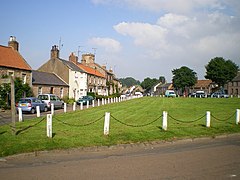Norham
| Norham | |
|---|---|
 Norham Village Green |
|
| Norham shown within Northumberland | |
| Population | 579 (2011 census) |
| OS grid reference | NT900471 |
| Civil parish |
|
| Unitary authority | |
| Ceremonial county | |
| Region | |
| Country | England |
| Sovereign state | United Kingdom |
| Post town | BERWICK-UPON-TWEED |
| Postcode district | TD15 |
| Dialling code | 01289 |
| Police | Northumbria |
| Fire | Northumberland |
| Ambulance | North East |
| EU Parliament | North East England |
| UK Parliament | |
Norham (/ˈnɒrəm/ NORR-əm) is a village and civil parish in Northumberland, England, just south of the River Tweed and the border with Scotland.
It is the site of the 12th century Norham Castle, and was for many years the centre for the Norhamshire exclave of County Durham. It was transferred to Northumberland in 1844.
It was on the Tweed here that Edward I of England met the Scots nobility in 1292 to decide on the future king of Scotland.
Sir Walter Scott gained fame as a poet, particularly with Marmion set around the Battle of Flodden in 1513. It begins:
The 19th century Ladykirk and Norham Bridge is a late stone road bridge that connects the village with Ladykirk in the Scottish Borders.
J. M. W. Turner always tipped his hat to Norham Castle, as it was the place which brought him fame as an artist. The picture of the castle which hangs in Tate Britain, luminously near-abstract, is one of the great treasures of the collection.
...
Wikipedia

